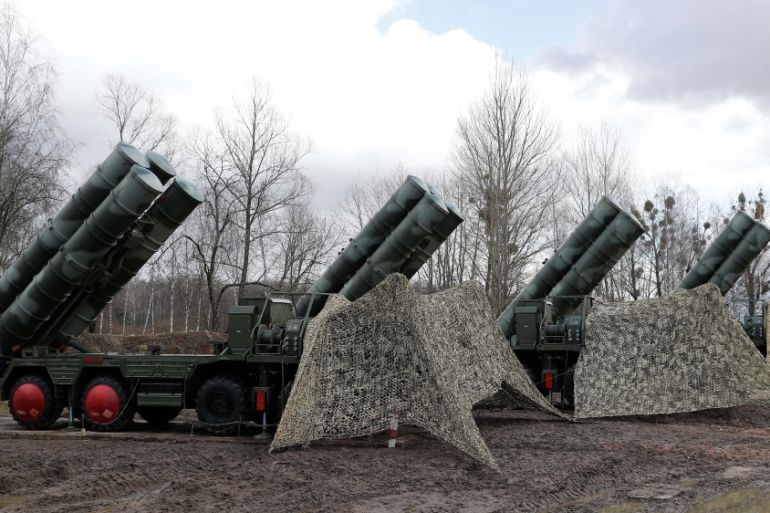What is next for Turkey after the local elections?
The economy, the Syrian crisis and air defence will be among the top priorities of the Erdogan administration.

Typically, municipal elections in Turkey do not make headlines in the international media. But the March 31 vote this year drew much attention at home and abroad. Istanbul, the largest city of the country and its economic capital, set the stage for a tight mayoral race, the result of which remains contested.
Regardless of the final outcome, the election disproved popular and unsubstantiated claims pandered by some western media outlets and pundits that Turkish democracy is dead. Well, it is quite alive and kicking.
The People’s Alliance – between the Justice and Development Party (AK Party) and the Nationalist Movement Party (MHP) – received over 53 percent of the national vote and maintained its popularity. Meanwhile, opposition candidates made some gains, notably in the capital Ankara. The mayorship in Istanbul is still contested and the Supreme Electoral Council, an independent legal body, is handling challenges as per Turkish law in a transparent fashion.
After Turkey wrapped up the municipal vote, for the first time in many years, it is entering a long election-free period that will last until 2023. In these four-and-a-half years, the Turkish presidency will focus on three main issues: the economy, the crisis in Syria and its defence capabilities.
On the home front, getting the Turkish economy back on track will be the administration’s top priority. In recent months, Turkey experienced an unprecedented and potentially devastating economic assault that it managed to survive.
The lesson learned from that episode was that the Turkish government needed to take necessary steps to make the nation’s economy more resilient to external shocks. By 2023, Turkey hopes to have strengthened its economy through export-driven growth, investment in technology and job creation.
Last week, Treasury and Finance Minister Berat Albayrak unveiled the administration’s plan for structural transformation, which places emphasis on strengthening Turkey’s free market economy, implementing tax reforms and promoting a more just distribution of wealth.
Reiterating the country’s commitment to fiscal discipline, Albayrak pledged to deliver debt securities worth $4.92bn to capitalise state banks and help private banks to raise their capital levels to address short-term issues. In the long run, the administration plans to introduce a new individual pension system based on income level. The Turkish government will unveil a plan to combat inflation on food prices next month.
At the same time, the Erdogan administration will devote time and energy to neutralising national security threats emanating from Syria. Under pressure from the foreign policy and defence establishment, US President Donald Trump reversed his initial decision to withdraw forces from Syria, even though Turkey demonstrated its willingness and ability to continue the fight against terrorism and extremism in the conflict zone.
Regardless of Washington’s decision, however, we have to take matters into our own hands. Over the past few years, Turkey partially addressed the threat of terrorism next door by targeting the “terrorist” organisations Kurdistan Workers’ Party (PKK) and the Islamic State of Iraq and the Levant (ISIL or ISIS) in northern Syria. Our next objective is to liberate Manbij, which remains occupied by PKK’s Syrian branch, and eliminate all terrorist activities between the Euphrates River and the Syria-Iraq border.
This is not just an isolated counterterrorism plan but part of a broader strategy to make Syria safe again and facilitate the voluntary and permanent return of Syrian refugees to their native land. Turkey has been part of all efforts, including the Geneva and Astana processes, to find a peaceful solution to the Syrian crisis. We remain committed to our original position that Bashar al-Assad has no future in the country, where he lacks the legitimacy to play any role in the post-conflict period. Together with our friends and allies, including the United States and Russia, we hope to finally put an end to the bloodshed next door.
Although Turkey boasts NATO’s second-largest army, the Syrian civil war convinced the Turkish leadership that the country needs to strengthen its air defences. After a years-long search for the best available technology and favourable terms of contract, we concluded an agreement with the Russian Federation to install the S-400 missile defence system on Turkish soil.
Provided that many other NATO allies, including Greece, possess Russian air defence systems, we reasonably assumed that our friends and allies would respect Turkey’s sovereignty. The entire process was public and Turkey’s expectations have been relayed repeatedly to the media.
Yet, just months before the delivery of S-400 in July, the US assumed an incomprehensible position to try and talk Turkey out of this done deal. Why Washington would try to stop a NATO ally from investing in its national defence, especially since it refused to sell similar equipment to Turkey in the first place, is beyond us.
The Turkish position remains the same: like any other country, we are interested in cordial relations with our neighbours and other regional powers. Our cooperation with Russia on energy, national defence and other areas does not mean Turkey has a negative view of the NATO alliance. That Turkey remains one of the top contributors to the Atlantic alliance’s defence speaks to that fact.
Thus, over the next four-and-a-half years, the Turkish presidency will take the opportunity to concentrate on solving pressing problems and addressing long-standing issues. Under the leadership of Recep Tayyip Erdogan, the country witnessed historic economic growth, attracted hundreds of billions of dollars in foreign direct investment, and emerged as a regional heavyweight. For the next four years, our administration promises more of the same.
The views expressed in this article are the author’s own and do not necessarily reflect Al Jazeera’s editorial stance.
